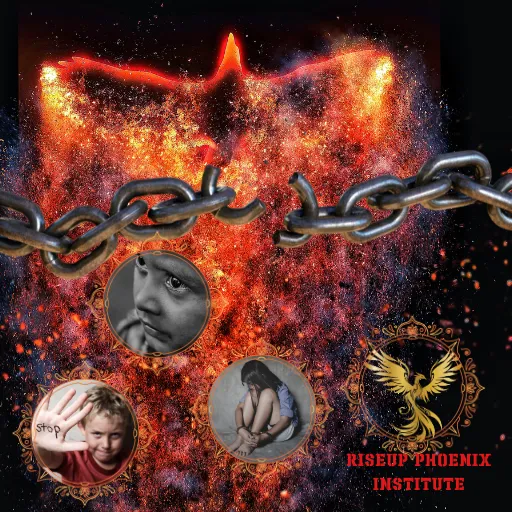
RISEUP: Heidi Chance, From Undercover to Awareness
Unmasking Sex Trafficking: A Detective's Journey from the Streets to the Classroom
In a world where human trafficking often hides in plain sight, former detective Heidi Chance has dedicated her life to exposing this dark underbelly of society. As your host of "RISEUP: Voices from the Front Lines," I'm thrilled to share the insights from our recent conversation with Heidi, an internationally recognized keynote speaker, sex trafficking trainer, and author.
From Badge to Podium: A Career Fighting Trafficking
Heidi's journey began in 1996 when she became the first female cadet in a groundbreaking Phoenix Police Department program. This early start set the stage for a career spanning over two decades in law enforcement, with a particular focus on combating sex trafficking.
"I was there in 2005 when we were just arresting prostitutes," Heidi recalls. "Now, we've evolved and recognized that those are actually more than likely victims. We're targeting the real bad guys – the sex buyers and the traffickers."
This evolution in approach highlights a critical shift in how law enforcement tackles sex trafficking. It's no longer about criminalizing potential victims but about understanding the complex dynamics at play and targeting the true perpetrators.
Debunking Myths: The Reality of Sex Trafficking
One of the most eye-opening aspects of our conversation was Heidi's breakdown of common misconceptions about sex trafficking:
• Myth: Trafficking always involves abduction.
• Reality: Most recruitment happens online, through social media and gaming platforms.
"It actually happens with your phone," Heidi emphasizes. "That is where traffickers are seeking out victims."
This revelation underscores the importance of digital awareness and education, especially for parents and young people. The average age of entry into sex trafficking has dropped from 15 to 13 in recent years, with some victims as young as 11 or 12.
Recognizing the Signs: What You Can Do
Heidi shared valuable insights on how the public can recognize potential trafficking situations:
• Look for groups of individuals dressed provocatively with similar tattoos.
• Be aware of sudden changes in a person's lifestyle or possessions.
• Pay attention to young people receiving expensive gifts from strangers.
If you suspect trafficking, Heidi advises:
1. Call your local human trafficking hotline or 911 if someone appears to be in immediate danger.
2. Provide detailed descriptions of what you've observed.
3. Never attempt to intervene directly – leave that to trained professionals.
"Being a good witness is just observing," Heidi stresses. "That is what being a good witness is. And reporting what you're seeing."
From the Streets to the Classroom: Empowering the Next Generation
Now, Heidi focuses on training law enforcement and educating the public. Her experiences have shaped a unique perspective on how to effectively combat trafficking:
• Target traffickers financially to disrupt their operations.
• Educate juries and the public about the realities of trafficking to ensure justice.
• Train female officers for undercover work, recognizing their crucial role in these operations.
"I'm very much trying to tell them, be careful what you post online," Heidi advises young female officers. "A defense attorney could find that, they're going to look, they're going to have a private investigator look because they want to make you look bad."
This advice extends beyond law enforcement to anyone in the public eye, highlighting the importance of digital footprints in our interconnected world.
What We Learned About Fighting Sex Trafficking
Our conversation with Heidi Chance revealed the multifaceted nature of combating sex trafficking. It's not just about arrests and prosecutions – it's about education, prevention, and changing societal perceptions.
Key takeaways:
1. The fight against trafficking requires a community-wide effort.
2. Digital awareness is crucial in preventing online recruitment.
3. Law enforcement strategies are evolving to focus on traffickers and buyers rather than potential victims.
4. Early education and open conversations with children about online dangers are essential.
As we conclude this eye-opening episode, I encourage you to act:
• Listen to the full episode for more in-depth insights.
• Check out Heidi's book and resources at achanceforawareness.com.
• Start conversations in your community about trafficking awareness.
Remember, awareness is the first step in prevention. By understanding the realities of sex trafficking and knowing how to recognize potential situations, we can all play a part in combating this global issue.
If you would like to support our battle against human trafficking and support victims you can make a one time or recurring tax deductible donation to our 501C3 Non-Profit battle2be.org
You can also join in our RISEUP Phoenix Building Blocks Community Membership and get access to all of our KIDSAFE courses, workshops, weekly group conversations and our resource library for parents, teachers and organizations that work with children to create resilient, confident, successful kids who have the best outcomes in even the worst of possible situations. Riseupphoenixinstitute.org
